Guest blog by Parker Duncan and Giorgio Guidett, MetaNames Co-Founders.
MetaNames is a decentralized Domain Name System (DNS) built on top of the Partisia blockchain. MetaNames enables users to create human-readable domain names that are linked to Partisia addresses, smart contracts, user socials and IPFS content.
MetaNames simplifies the process of interacting with the blockchain. Instead of using long, complex hexadecimal addresses for transactions, MetaNames allows users to use short and easily recognizable domain names, just like traditional domain names on the internet.
The key benefits of MetaNames include:
Moreover, MetaNames brings fresh air to the NS ecosystem by leveraging Partisia features such as privacy-preserving contracts and BYOC logic:
Check out our roadmap below:
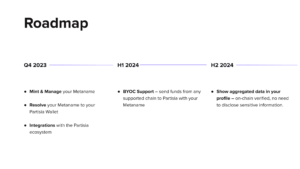
MetaNames aims not just to provide a base and core chain infrastructure but to fully leverage Partisia Blockchain’s innovative technology to improve the current NS industry.
Stay tuned for more, and keep up to date with us by following our Twitter!
Guest blog from Moojan Asghari, Thousand Faces Co-founder and CEO
Thousand Faces is a reward-based crowdfunding platform powered by Partisia Blockchain. It aims to address funding gaps and support impact-driven female founders. With only 1.9% of venture capital funding allocated to all-female founding teams, there is a huge gender gap in funding.
While women currently make just 30% of climate-related decisions, they have proven to excel in building sustainable businesses, resulting in organizations led by women being 2.5 times more profitable. Recognizing the significance of funding more women and providing them with leadership opportunities, Thousand Faces seeks to democratize funding for women and minorities by offering both financial resources and a powerful network.
Driven by the frustration of limited funding and support for underrepresented groups, we embarked on a mission to leverage the principles of Web3, namely transparency, ownership, and decentralization, to serve both people and the planet. The lack of inclusivity in investment decisions, particularly regarding women and minority-led ventures, poses a significant challenge. Research shows that unconscious bias often leads investors to favor individuals who resemble themselves, perpetuating the underfunding of women and minorities. To address this issue, Thousand Faces turned to the powerful capabilities of Partisia Blockchain.
Partisia Blockchain introduces an innovative approach to tackle this problem through its zero-knowledge and voting mechanisms. Leveraging the secure content and zero-knowledge voting developed by Partisia Blockchain, Thousand Faces is building a decentralized autonomous organization (DAO). This empowers the creation of an inclusive and transparent voting system that ensures the active participation of a diverse community.
The voting system operates at two levels. Firstly, a diverse jury panel plays a crucial role in the initial voting stage, utilizing the zero-knowledge bootstrapping of Partisia Blockchain to ensure process security. Additionally, a committee-based second level of voting includes the entire community, consisting of token holders and NFT members. This approach guarantees that community members, who act as funders and supporters, have a voice in selecting projects and monitoring their progress.
Thousand Faces has already launched its first membership and NFT collection, available on the website for interested individuals to explore and apply for private sales. You can apply to join the Thousand Faces membership on the allowlist here. The platform has also established a dedicated member’s board and successfully completed its inaugural acceleration program for female founders. We received over 200 applications from nearly 80 countries, aligning with diverse UN Sustainable Development Goals (SDGs). From Kenya, Nigeria, Germany, Lebanon, Singapore, and the UK, six outstanding projects reached the final round. At the awards ceremony in April, the top three were granted US$30,000, with support from sponsors including Sandbox and the World of Women Foundation.
To stay updated on our latest developments and join us on our exciting journey, follow us on Twitter or visit our website. We’re excited to be part of the Partisia Blockchain ecosystem and are fully committed to transforming the inclusivity in the web3 space and beyond.
Website | Twitter | Linkedin | Telegram | Discord | Medium | Instagram
Guest blog from Mariia Kren, eTrusty Co-founder and CEO
Corruption represents a significant hindrance to both economic growth and human development. Among various processes, procurement is particularly susceptible to corrupt practices, leading to substantial financial losses estimated at around €400 billion per year in European public procurement.
Furthermore, the procurement market faces another challenge as it is expected to grow from US$12–US$13 trillion in the next five years to approximately US$16–US$19 trillion. As procurement costs rise, the need for tender sites to scale rapidly becomes increasingly important.
In our commitment to combat corruption, restore trust in procurement, and facilitate the scalability of procurement platforms, we are delighted to introduce eTrusty.
By implementing blockchain technology, eTrusty fosters transparency through a publicly accessible ledger, ensuring secure and transparent monitoring of transactions and information. Moreover, it provides a decentralized and immutable data state, ensuring the secure storage of data. These features effectively mitigate client distrust and significantly reduce the risks associated with technical fraud.
A pivotal aspect of our confidence in implementing eTrusty lies in our collaboration with Partisia Blockchain. By harnessing the power of Multiparty Computation (MPC) with Zero-Knowledge (ZK), eTrusty establishes customizable layers of privacy for various aspects of procurement, such as applicants, judges, and results. This robust privacy framework effectively combats human fraud, coercive practices, and bribery. To elevate the scalability of eTrusty, we have integrated Partisia’s groundbreaking solution, Bring Your Own Coin, to establish a cross-border solution. Furthermore, the architecture of eTrusty enables customization to cater to diverse procurement requirements.
Currently, we are diligently developing our smart contracts, user interface, and back-end prototype. Our Minimum Viable Product (MVP) is scheduled to be completed in the last quarter of 2023. This MVP will be a web application showcasing all the key features of our API, which we plan to seamlessly integrate into existing tender platforms in the future.
The mission undertaken by eTrusty is of utmost importance and highly relevant in the current business landscape, where accountability and transparency are increasingly demanded. We eagerly anticipate the continued evolution of eTrusty’s protocol and its meaningful contribution to the broader objective of cultivating a fairer and more sustainable global economy.
As proud members of the Partisia Blockchain ecosystem, we invite you to follow us on our journey to shape the future of procurement!
15 May 2023 — Today marks the launch of the Insights Network’s Parti.com, a unique platform that empowers creators with Web3 technology and cryptocurrency transactions for content monetization. This hub for creators provides unprecedented control over their creative output, while enabling them to earn revenue through self-hosted cryptocurrency. Parti.com is built on the open-source technology of Partisia Blockchain, renowned as the world’s first privacy-preserving, next-generation blockchain. It offers multi-network currency support and affordable transactions.
Parti.com, designed to be an inclusive platform, provides users with self-custody of their funds, ensuring complete ownership and control. The platform’s ease of use, facilitated by a straightforward account setup process via Discord or Twitter login, makes it accessible to both creators and consumers.
Parti.com simplifies the buying and selling process by completely removing third parties, such as traditional banks and other Web2 financial institutions, from the monetization process. This marks the first time that creators and content consumers can interact within a completely peer-to-peer network, without payment processors or middlemen holding user funds.
One of the key features of Parti.com is the ability to create and sell NFTs directly from creator profiles, simplifying the process of content monetization. The AI Zone helps new creators generate art rapidly; thereby, democratizing the digital art landscape.
Furthermore, Parti.com breaks new ground with its application of NFTs as utility tokens, granting access to exclusive content. This concept, known as “tokengating”, is set to change the way creators engage with their audiences, fostering deep, meaningful connections. An easy-to-understand use case could involve a content creator creating a pass with a maximum of 1,000 units sold. All holders of this NFT, upon signing into their platform with their wallet, are granted access to all of the creator’s private content available on their Parti.com channel. This process, completely automated by the blockchain, creates a direct, creator-to-user connection that surpasses anything the current market offers, be it Web2 or Web3. The platform also accommodates transactions with ETH in Metamask, providing users with the flexibility to transact in their preferred cryptocurrency.
To jumpstart the network, Parti.com offers the unique “Hall of Fame” (HOF) NFT pass. This limited NFT access pass grants users master access to the entire network, enabling the first users to buy into the entire network and never have to pay for content access again. Coupled with the platform’s low transaction fees, this feature is set to redefine the value proposition for content creators and consumers. In the future, if users wish to leave the network, they can always offer the pass for sale in the upcoming NFT marketplace.
Parti tokens function as the platform’s currency, which users can use for buying and selling. Creators incur a 0.1% platform fee when selling NFTs or content in Parti tokens, compared to a 5% fee when using ETH or USDC. Although this fee model is subject to change, there is currently no fee for creators for at least the next three months, serving as an incentive to join the network early.
In essence, Parti.com is more than just a platform — it is a revolution in the creator economy. It is dedicated to providing creators with the tools they need to thrive, while offering consumers a new way to interact with and support their favorite creators. As the digital landscape continues to evolve, Parti.com stands at the forefront, poised to transform the creator economy with the power of Web3.
About Parti.com: Parti.com is built by Insights Network, a web3 Company founded in 2017 and through multiple market cycles.
About Partisia Blockchain Foundation: Partisia Blockchain Foundation brings unparalleled opportunities by empowering privacy-preserving, interoperable and sustainable innovation for fairness and transparency. It fuels the most secure and efficient networks to solve global problems. Distilled with more than 30 years of rigorous research, Partisia™ Blockchain future-proofs solutions, solves tomorrow’s challenges by powering fair, secure, distribution of benefits. While preserving privacy and confidentiality, it brings accountable, transparent and decentralized governance. Learn more: www.PartisiaBlockchain.com
Website • Twitter • Discord • Telegram • LinkedIn • Facebook • Instagram • GitLab • Medium • YouTube
Guest blog from Vlad Chejkov, Blockchain-Ads Founder
As the founder of Blockchain-Ads, I am thrilled to be featured in the Ecosystem Spotlight, where we are shedding light on the revolutionary changes we are bringing to the Web3 industry.
Blockchain-Ads is specifically designed to bridge a gap in the market where Web3 brands struggle to reach their ideal customers. Traditional ad networks often restrict crypto-related promotions, and none of the crypto ad networks currently allow targeting based on users’ on-chain behaviour.
Blockchain-Ads platform offers Web3 brands the opportunity to connect with their target audiences efficiently and effectively, outperforming the competitors 10 to 1.
Our collaboration with Partisia Blockchain has been fundamental to our success. Their pioneering multiparty computation (MPC) and zero-knowledge (ZK) technologies serve as the backbone of our solution. They ensure user data is processed securely while facilitating targeted advertising. This approach respects user privacy and transforms the digital advertising landscape without revealing any underlying data or compromising user privacy.
Currently, we are at an exciting juncture. We are preparing to launch Partisia smart contracts on testnet in the first half of May. It is a crucial step that will help us refine our solution in a secure environment before launching on the mainnet.
As we forge ahead, our mission is clear: to disrupt the conventional, centralized advertising industry with a decentralized, privacy-preserving, and cost-effective solution. We aim to redefine privacy and user control in the digital advertising landscape, tailoring specifically to the needs of Web3 brands.
For more insights into our progress and to stay abreast of our exciting journey, follow us on Twitter or reach out through our website. We are proud to be part of the innovative Partisia Blockchain ecosystem and look forward to reshaping the future of privacy-preserving advertising in the Web3 space.
Guest blog from Gordon Povey CEO & Founder at Kin
Kin is a Web3 ad-free search engine built around community, transparency, and privacy. The prototype has been operational for over a year and on 1 May 2023 we launched the Kin beta https://searchkin.com.
Our aim is to be a disruptor and so we are highly differentiated from incumbent search engines like Google.
We are building a community of users that believe in Web3 principles. We use blockchain and a smart contract for transparency. We will use multiparty computation (MPC) technology to ensure maximum privacy for users at all times.
We have thrown out the traditional advertising business model where the user is the product to be sold to advertisers. Instead, we become a broker of both information and also online products.
So metaphorically, if you want to go to the library for information, we become your personal librarian and try to find exactly what you are looking for without trying to sell you anything or distract you along the way. Then, if you do want to go to the shopping mall (metaphorically) to buy something, we are like your personal shopper trying to find exactly what you want and can even uncover local or artisan products that are usually difficult to find online.
We generate revenue as a broker only when we find what you really want. By taking this approach, we find information that is less skewed by large commercial SEO budgets, and we can discover online products that are often hidden by advertising and brand dominance.
We knew we needed to work with a Layer 1 blockchain so that we could mint our own tokens. We also knew that we needed a secure way to process user data while maintaining complete privacy. The fact that Partisia Blockchain was offering not just a blockchain, but also MPC capabilities made it a front runner.
We have just launched the Kin beta. The organic search (for web, news, images and videos) is working extremely well. We believe it provides better results than the incumbent search engines (try it for yourself and compare our results to other search engines).
We still have work to do on the shopping searches, which are limited and UK-centric at present. We will also be turning on the user rewards system very soon. To fund future developments, we are opening another token pre-sale, which will allow early supporters of our project to buy tokens at a discounted price. The funds will be used for the product launch and marketing, and for ongoing developments such as the implementation of our community-based training (using xAI methods) which is included in a patent we recently had granted.
Learn more about us: Search engine, Website, Email, Telegram, Twitter, LinkedIn
Most may not know, but generating random numbers is hard. It is quite surprising because many people will think, “well, I can just come up with a random number off the top of my head!” However, randomly coming up with a number in your head, as well as other solutions to generate random numbers has fundamental flaws. And this is a big problem. Generating a fair unbiased random number is critical. In fact, random number generators are used everywhere.
The first place many would think of random numbers being useful is in games of chance. But would you be surprised if you knew that reading this article required the use of a random number generator? The website hosting this article is protected by a cryptographic key, which relies on generating a random set of values to be used for the encryption key.
Generating numbers at random is difficult. At a high level, there are two main issues with generating random numbers: predictability and bias/corruption issues.

The predictability issue for RNG can be seen in both human- and machine-generated random numbers. For example, there is a famous problem called Benford’s Law that states any random number that someone thinks about has a 30% chance of starting with the number 1. When you want to have a chance of a number being generated to be equal in percentage, then this becomes a problem. If you use a computer program to generate random numbers, you are using a structured code. This means, after multiple iterations, someone can reverse engineer the numbers to find the pattern and predict what the next number could be, especially if the code being used is weak.
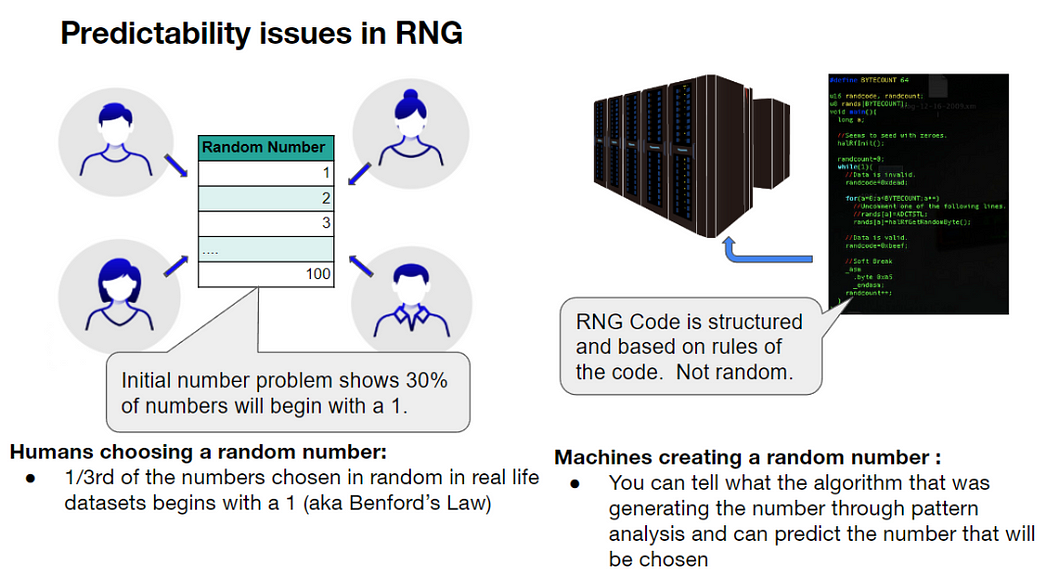
From a bias and corruption perspective, the current systems can also be gamed to give favor to someone. For instance, if a set group of people decide they will choose random numbers and run through some function to compute a random number, one person may withhold showing their number until they see what the other people have chosen. Then, once he knows the numbers of the other participants, he can choose a number that would compute the random number to his favor. From a machine generated random numbers, since most systems have a central system that is generating the numbers, anyone who has control of that system could also manipulate the numbers being generated to their favor.

So how can we create a system where it is both unpredictable and bias free? Through MPC and Partisia Blockchain, we can solve both problems. Through smart contracts, players in the system generate a random number. This random number is then privatized and sent into the PBC blockchain. A zero-knowledge computation is done, in a similar way as done through secret sharing and through a computation, a random number is revealed.

Through combining multiple players and secret sharing, developers can create a system to come up with a random number that is free from bias, incorruptible and impossible to predict. And Partisia Blockchain’s smart contract language will afford developers to customize this solution to their specific requirements.
By creating a programming language that allows for developers to use MPC in a generic way, Partisia Blockchain Foundation has made the creation of applications that can harness the power of MPC for different use cases a possibility. Partisia has been at the forefront of providing private MPC solutions since 2008. And by layering this technology on top of an interoperable and scalable blockchain, Partisia Blockchain is now paving the way for anyone to create solutions that can balance privacy and transparency to build trust.
To learn more about different use cases or partner with us for solutions, please visit partisiablockchain.com, check out our Medium articles, development documentations or email us at build@partisiablockchain.com.
In April 2023, Partisia Blockchain had an eventful month with exciting updates and developments. We welcomed Bakyt Azimkanov as the new Head of Communications, signaling a commitment to expanding its reach and global presence. The Spotlight Solutions campaign continued to showcase our MPC technology capabilities in enhancing security and trust in the blockchain industry. Partisia Hivemind Huddles was launched, providing a space for the community and team to discuss a variety of topics and encourage collaboration. And we distributed the third quarter staking rewards. Finally, we also shared several tech updates, including the launch of the ETH price oracle on testnet and the enabling of multiple inputs in an MPC contract, among other updates.
Last month, we were thrilled to share some exciting organizational highlights. Partisia Blockchain Foundation recently welcomed Bakyt Azimkanov as our new Head of Communications, marking a significant addition to our leadership team. Bakyt is an accomplished professional with years of experience in strategic communications, branding, and press outreach programs across blockchain, financial services, and technology. Before joining us, he served as the Head of Communications at the Cardano Foundation. In his new role, he will oversee the development and implementation of a comprehensive communication strategy aimed at increasing awareness and driving adoption of our blockchain technology with cutting-edge multiparty computation capabilities.
We were delighted to have Bakyt, along with another excellent addition to Tiago Serôdio, Head of Community, attend Consensus 2023 in Austin, Texas, to represent Partisia Blockchain. Our team was thrilled to meet new and old friends in the community and engage in fruitful discussions about the future of blockchain technology. We had a great time networking and learning about the latest trends and innovations in the industry and were delighted to see so much enthusiasm for our MPC blockchain technology. If you missed us at the event, please reach out to us and let’s connect. We look forward to seeing you at the next blockchain event.
Throughout April, we continued to highlight our Solutions Spotlight campaign, including Secret Surveys, Preventing Front Running, Privatized Settlement Layers, and Data Sharing showcasing how Partisia Blockchain’s MPC technology can enhance security and trust in the blockchain industry. Our Head of Community, Tiago Serôdio, and Head of Developer Relations, Bruce Ahn, led a series of Spotlight AMAs and Q&As to educate our community on how our MPC technology can solve real world problems.
Last month, we were thrilled to launch Partisia Hivemind Huddles! Our inaugural monthly Hivemind Huddle took place on Friday, 21 April 2023, providing a space for our community and team to come together and discuss a variety of topics, while encouraging everyone to participate with their ideas and thoughts. This informal and welcoming forum is designed to promote open communication and collaboration. For the first session, we focused on answering recent questions from our community through an AMA format. For those who could not attend, we will hold a second session that will recap the first session and address any follow-up questions. Stay tuned for updates on the next Hivemind Huddle, and mark your calendars to join us for lively discussions and brainstorming sessions.
Our ecosystem is growing! Our partners have been working hard and making progress building on our chain. Our sales team also has been busy and are working through more than 40 new leads and prospects. We have also seen higher interest in our blockchain and, as a result, have received multiple pitch ideas and we are busy working to get them onboarded and begin development. Please be on the lookout for our ecosystem spotlight in May for more details.
Third quarter rewards distributed. We have distributed our bootstrapping rewards for the third distribution quarter (December 2022 — February 2023). This is also our first distribution for our community stakers and more than 650,000 MPC tokens were distributed. Even better, we expect our next quarter rewards to be over one million! So, if you have not staked your tokens, please read this guide and put your tokens to work.
Website • Twitter • Discord • Telegram • LinkedIn • Facebook • Instagram • GitLab • Medium • YouTube
Trust is the basis for any relationship. Whether it is between you and your friends, or between one company working with another, even with governments sharing information with each other. Without trust, society cannot exist. Every type of a relationship requires some type of trust that is built through time.
But what is trust? And how does one go about establishing it with another entity? Trust is earned through a give-and-take between parties and demonstrated pattern of reliability. It is also relative, as everyone has a different level of risk appetite. A balance that is relative to the amount of risk the person is willing to take against the amount of reliability the other party has demonstrated in the past.
So how does this balance take place?
Clearly, if no one is willing to share or demonstrate anything about themselves, trust cannot be established. There has to be some level of vulnerability to even begin the initial stages of establishing trust. But at the same time, complete and full transparency also does not help establish trust. And this is because almost all relationships start off mutually distrustful. Trust is something earned. If given to someone arbitrary, that person could use that trust against you.
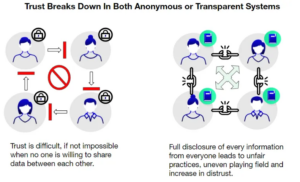
And in a way this balance of privacy and transparency to establish trust has been tipped in favor of one side to another throughout history. How many times have you or someone you know been burned by giving trust to someone who–knowingly or unknowingly–betrayed it? How many deals are broken between companies? How many government secrets have been compromised through leaks? Building trust is a gradual process, where one party shares something in hopes that the other party shares something of equal value.
But what if there was a way to share information without sharing information?
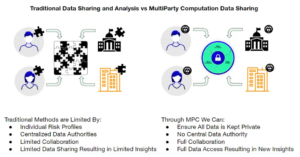
As we reviewed in other articles, multiparty computation allows for the computing of data even if the owner does not share the details around it. And in the example of sharing of data, this means any mutually distrustful parties can collectively allow the use of their data without sharing the details of data itself.
What does this mean in practice? At a high level, this means you can now reduce the weight of risk in the balance of establishing trust. Because you no longer have to expose your private data, the risk of that data being used against you is lowered. And this means you no longer require the same heavy weight for demonstrated reliability that you would need on the other side of the trust scale.
This is a game changer on many levels. Trust is the fundamental basis for any relationships between entities. With MPC, we now have the opportunity to change how this can be played.
In the example below, let’s say we have two financial companies that are competitors. They have a lot of secrets they would like to keep internal, but they do business with each other as a part of their overall practice. As a result of their business, there are many mutual clients. If there was a suspicious activity in one of their clients, having a single set of data they can analyze may not be enough. But what if both companies could share the use of their data together for forensic analysis without sharing the details of the data itself? This may lead to a far more comprehensive analysis.
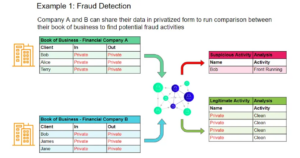
Another example is where multiple companies need to validate meeting of certain regulatory or compliance goals. But to compute the data, it requires exposing private information. Through MPC and Partisia Blockchain, a company will be able to validate meeting regulatory goals without exposing their data to the public.
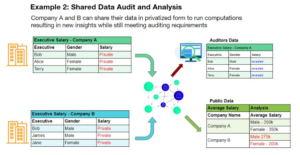
These are very simple examples of how companies can still work together without revealing their private data. And we have quite a variety of projects building on Partisia Blockchain that takes advantage of this new way of doing business.
CyberPeace Institute is working with Partisia Blockchain to help NGOs combat the issue of malware and ransomware by allowing NGOs to privately work with other parties who may be facing similar attacks. This allows NGOs to work together with others without reputation impact or exposing information that may create other vulnerabilities in their system.
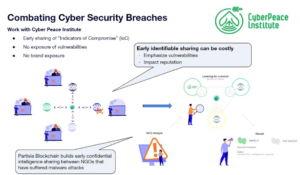
Monadi is working on helping companies comply with CSRD regulations that will impact over 50,000 companies in the EU. By 2025, companies will need to validate that they are meeting certain SDG goals, with the first goal being able to certify that there is no gender pay gap in their executives’ compensations. As the regulation matures, Monadi will be in a good position to help companies certify other SDG requirements without the need for the company to expose private data.
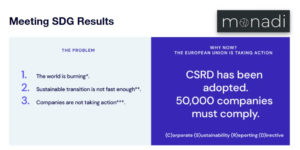
With a growing number of partners and integrators looking to solve the issue of trust, Partisia Blockchain is well positioned to help provide the solutions we need–whether it is to address the transparency in blockchains or to solve existing problems outside the blockchain space.
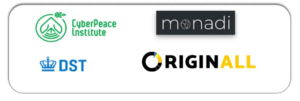
For additional insights on this use case, come and watch our Q&A session we did on this topic.
By creating a programming language that allows for developers to use MPC in a generic way, Partisia Blockchain Foundation has made the creation of applications that can harness the power of MPC for different use cases a possibility. Partisia has been at the forefront of providing private MPC solutions since 2008. And by layering this technology on top of an interoperable and scalable blockchain, Partisia Blockchain is now paving the way for anyone to create solutions that can balance privacy and transparency to build trust.
To learn more about different use cases or partner with us for solutions, please visit partisiablockchain.com, check out our Medium articles, development documentations or email us at build@partisiablockchain.com.
Ledgers are the primary ways settlements are recorded. The first double bookkeeping ledger system was recorded in use as far back as the 1300s. It is still the de-facto system used today to record transactions between entities.
Fast forward to 2008. Satoshi Nakamoto (pseudonym) was frustrated with the corruption due to the lack of transparency and centralized control of the traditional system. He proposed a transparent distributed ledger system that was immutable as a system of recording transactions. Thus Bitcoin was born.
But with all new systems, there is always room for improvements.
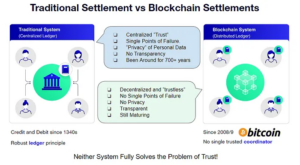
As discussed in our previous articles, full transparency does not solve the problem of building trust. In fact, privacy is a requirement in any trust relationship. For example, nobody would trust a credit card provider that revealed every purchase cardholders made just by someone having their credit card number. In a traditional blockchain space, every transaction is written in a public ledger. It would only require matching a wallet address to a name to see the full history of their transactions.
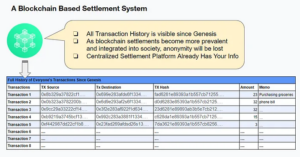
How can you have a blockchain that privatizes transactions and has enough flexibility to analyze and compute the data? Through integrating a proven technology into a scalable and interoperable blockchain.
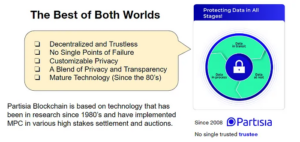
Developers can pick and choose which part of the data in the blockchain needs to be private and which can be public. All thanks to the Partisia Blockchain’s programmable MPC. A layer of governance can be enabled around the private data to allow for computation and access to select individuals. Those who access the data can also be audited transparently.
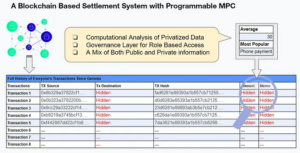
Now, even if someone has your credit card details, they will not be able to see your purchase history and your spending. If needed, a governance model can be created to ensure auditability and traceability to the system.
The importance is evident in our partnership with the International Committee of the Red Cross (ICRC). We partnered with the ICRC to build out a program for distributing aid through blockchain. One of their key requirements was privacy of the aid recipients. As they are a very unique organization, one of their key principles is in confidentiality and bilateral dialogue. The ICRC mainly operates in conflict zones and lack of privacy can mean life or death.
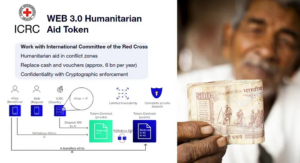
ICRC was able to solve their key challenge of privatizing the transactions of the stable tokens in the ecosystem thanks to Partisia Blockchain’s MPC. As shown above, the deposit of the funds from ICRC is kept private. As a result, transfers between the users are anonymous. To learn more, please watch our video of the overview of the solution here.
As blockchains become more prevalent, the need for privacy will continue to grow and take center stage. Various projects are already being built with private settlements in mind. We continue to speak with many organizations who prioritize the need for privacy in a blockchain solution.
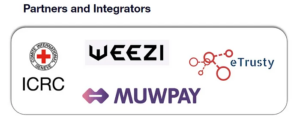
For additional insights on this use case, come and watch our Q&A session we did on this topic.
By creating a programming language that allows for developers to use MPC in a generic way, Partisia Blockchain Foundation has made the creation of applications that can harness the power of MPC for different use cases a possibility. Partisia has been at the forefront of providing private MPC solutions since 2008. And by layering this technology on top of an interoperable and scalable blockchain, Partisia Blockchain is now paving the way for anyone to create solutions that can balance privacy and transparency to build trust.
To learn more about different use cases or partner with us for solutions, please visit partisiablockchain.com, check out our Medium articles, development documentations or email me at bruce.ahn@partisiablockchain.com.
ZÜRICH, 12 April 2023. Partisia Blockchain Foundation proudly announces the appointment of Bakyt Azimkanov, an accomplished and award-winning professional, as the Head of Communications, effective immediately. This strategic hire supports the organization’s expansion plans and underscores its commitment to increasing its voice and raising its awareness worldwide.
A former Head of Communications at the Cardano Foundation, Bakyt joins the organization with decades of experience in strategic communications, integrated public relations campaigns, branding, and press outreach programs across blockchain, financial services, and technology.
In his new role, Bakyt will develop and oversee the implementation of a communications strategy to raise Partisia Blockchain Foundation’s profile and drive adoption of the fourth generation blockchain, which features unparalleled multiparty computation technology.
As a trusted counselor to the leadership team, Bakyt will provide expert advice on unified communications initiatives to increase awareness and share of voice. He will also advise on leadership positioning strategy, execution tactics, and implementation methodology.
Kurt Nielsen, President of Partisia Blockchain Foundation, expressed his excitement for the appointment, saying, “We are thrilled to enlist the rich expertise and visionary leadership of Bakyt, who boasts a remarkable array of proficiencies and extensive experience in steering value-driven purpose-led communications initiatives. We are confident that his unique skill set will be instrumental in bolstering the standing of Partisia Blockchain within the global blockchain arena. With unwavering conviction, we anticipate his invaluable contributions in advancing our ethos and perpetual metamorphic objectives.”
Before joining Partisia Blockchain Foundation, Bakyt held numerous senior leadership positions at major global organizations, including leading transformational programs at the Cardano Foundation. He led its positioning overhaul, ICAD-nominated brand refresh and built its brand, marketing, community management and communications functions.
Outside the blockchain industry, Bakyt previously led the global media relations and social media at EY (Ernst & Young), a professional services organization, focusing on strategy and transactions, namely mergers and acquisitions, divestments, and private equity, where he played a pivotal role in securing and maintaining a number one share of voice in the media. Bakyt is also one of the founding partners of Syyx, a Web3 full-suite marketing and communications boutique set up by former Cardano leaders.
Bakyt is a trained journalist with a Master of Arts degree in Business and Finance Journalism from City University (United Kingdom), a second Master of Arts degree in Media Studies and Communication from the University of Aarhus (Denmark), and a Bachelor of Arts degree in Journalism and Public Relations from the American University of Central Asia (Kyrgyz Republic).
Partisia Blockchain Foundation is honored to welcome Bakyt Azimkanov to its leadership team and looks forward to his contribution in elevating the company’s communications function to new heights.
About Partisia Blockchain Foundation: Partisia Blockchain Foundation brings unparalleled opportunities by empowering privacy-preserving, interoperable and sustainable innovation for fairness and transparency. It fuels the most secure and efficient networks to solve global problems. Distilled with more than 30 years of rigorous research, Partisia Blockchain future-proofs solutions, solves tomorrow’s challenges by powering fair, secure, distribution of benefits. While preserving privacy and confidentiality, it brings accountable, transparent and decentralized governance. Learn more: www.PartisiaBlockchain.com
Stay updated: Website • Twitter • Discord • Telegram • LinkedIn • Facebook • Instagram • GitLab • Medium • YouTube
In a traditional asset trading platform, front running is defined as the illegal practice of placing a trade based on advanced non-public knowledge of an upcoming trade which can impact prices. As shown in the example below, a broker can take advantage of a situation when he or she gets a large order by one of their clients. Since they know this order will impact the price of the asset, they place their own personal order ahead of their client’s order. Then, they place the client order, raising the stock price. Once this is done they will sell their own shares to profit off their clients order.
Another term used often is insider trading, which is based on a very similar practice of using information only they have access to in order to gain an unfair advantage over others.
In the Web3 space, everything is transparent and, ironically, revealing too much information can also create these situations. An example of this is front running on a decentralized exchange (dex) that you may have already heard of. This type of a front running is possible through the combination of having total transparency in the blockchain along with how Ethereum (and many other blockchains) prioritize transactions in a node’s mempool.
In this particular example, an attacker (usually a bot) scans the mempool to see a particular scenario that they can take advantage of. Scanning the mempool, they look for an opportunity to insert in a bid at a lower price but higher gas than another large bid already in the mempool.
Once their bid completes, they wait for the larger order to go through, raising the price of the asset. Then they place a sell order at a higher price than the buy order he placed ahead of the larger order, and pockets the difference. All this is happening in a blink of an eye, making it impossible for any normal person to be able to recognize they are being taken advantage of.
But what if we could make the orders private? This prevents the attacker from being able to read the auction details in the mempool, and making the bot unable to identify a situation to take advantage of.
Through multiparty computation (MPC), details can be kept private while still computing the winner. In the situation of this dex, the results of the prices are not revealed until the bids are completed, ensuring that attackers cannot gain any advantageous information ahead of time.
The team in Partisia has already provided solutions to solve this issue in multiple scenarios. From governments to OTC trading platforms, they have been trusted to run high stakes auctions in different levels and through enabling this technology on a blockchain, we are giving everyone the power to solve the problem of ensuring integrity in the bidding process.
For additional insights on this use case, we recommend viewing our Q&A session on this topic.
By creating a programming language that allows for developers to use MPC in a generic way, Partisia Blockchain Foundation has made the creation of applications that can harness the power of MPC for different use cases a possibility. Partisia has been at the forefront of providing private MPC solutions since 2008. And by layering this technology on top of an interoperable and scalable blockchain, Partisia Blockchain is now paving the way for anyone to create solutions that can balance privacy and transparency to build trust.
To learn more about different use cases or partner with us for solutions, please visit partisiablockchain.com, check out our Medium articles, development documentations or email me at bruce.ahn@partisiablockchain.com
As the first quarter of 2023 draws to a close, Partisia Blockchain is celebrating a successful start to the year. Our team participated in the renowned Paris Blockchain Week, where we showcased our latest solutions, including our revolutionary private voting technology. Additionally, we celebrated International Women’s Day with our Paris Hackathon winner, Thousand Faces, a community-driven investment platform that provides inclusion and accessibility for female and diverse founders. We are committed to supporting Thousand Faces’ goals and are thrilled to witness our network being utilized to address societal challenges. We also welcomed our new Head of Community, Tiago Serôdio, who will provide expert guidance on scaling and diversifying our community. At Partisia Blockchain, we remain committed to driving innovation, empowering our community, and delivering cutting-edge solutions.
We are delighted to announce the appointment of Tiago Serôdio as the Head of Community at Partisia Blockchain. With over 10 years of experience in building and running communities, Tiago’s appointment underlines our commitment to engaging our community and achieving our growth objectives. He brings a wealth of expertise in marketing campaigns and community management from his notable work at Cardano. We are excited to have Tiago on board and look forward to collaborating with him to scale and diversify our community. Additionally, we are thrilled to share that our team and collective skillset is expanding, with more Web3 professionals set to join. Stay tuned for more updates!
First and foremost, we were happy to meet our community members in Paris at the end of the month. Visitors of our booth during the Paris Blockchain Week were treated to exclusive merchandise and met with our delegation. Our community members were very supportive and active during the voting for the inaugural Paris Blockchain Week Awards. This afforded us to showcase one of our key solutions — private voting. Thousands have cast their votes and had an opportunity to experience our zero-knowledge voting. Therefore, we start our Solutions Spotlight campaign with a focus on private voting. Each week we will highlight one of our solutions and our new Head of Community, Tiago Serôdio, will lead a series of Spotlight AMAs and Q&As. The first one took place on 30 March 2023 focusing on private voting. The next ones will focus on secret surveys (6 April 2023), front running (13 April 2023) and privatized settlement layer (20 April 2023). Stay tuned!
In March, development work was mostly focused on improvements to key infrastructure functions. From fixing bugs to improving various invocations, we have been continuing to improve upon existing functionality.
In April, we plan to launch our first version of our Eth pricing Oracle on our testnet. This is an important milestone for our mainnet where BYOC transfers will now accurately reflect actual prices. This will both benefit our node operators to get more accurate fee distributions on their BYOC rewards, as well as allow for more accurate transferability on our Hermes bridge.
Website • Twitter • Discord • Telegram • LinkedIn • Facebook • Instagram • GitLab • Medium • YouTube
Voting is an integral part of the election process. It is important to have transparent and tamper-proof voting systems that can be trusted through no single centralized authority whether it is selecting your class president in high school, voting as a shareholder in a listed company or electing government officials.
Through the distributed ledger system, we have a way to ensure transparency where all votes can be logged in an immutable record system. Each voter is accounted for in the blockchain. When the vote is cast, both voter ID as well as who or what they voted for is also recorded in a permanent way. But what about the privacy of the individuals and whom they casted their votes for?

This is one of many challenges Partisia Blockchain solves though the use of cryptography and mathematics. Through multiparty computation (MPC) technology, our solution shows verifiable proof of an accurate election without revealing any details about the voter. But how does this work?

Multiparty computation is a technology created in the 1980s that allows computation of results while keeping their input private, enabling trust between mutually distrustful parties. In the voting example, we use shamir’s secret sharing to have the smart contract create a random line that intersects with the vote details that have been vectorized. In the example below, candidate 1 is represented by 0 and candidate 2 is represented by 1. Four random points are chosen from this line, and each point is sent to a separate MPC node for computation. Through these lines, we can compute on finding the winner without revealing who each person voted for.

For additional insights on this use case, come and watch our Q&A session we did on this topic.
By creating a programming language that allows for developers to use MPC in a generic way, Partisia Blockchain Foundation has made the creation of applications that can harness the power of MPC for different use cases a possibility. Partisia has been at the forefront of providing private MPC solutions since 2008. And by layering this technology on top of an interoperable and scalable blockchain, Partisia Blockchain is now paving a way for anyone to create solutions that can balance privacy and transparency to build trust.
To learn more about different use cases or partner with us for solutions, please visit partisiablockchain.com, check out our smart contract examples or email our head of developer relations at bruce.ahn@partisiablockchain.com
The shortest month of the year was a time of steady progress. The first voting on blockchain being the highlight, updates to our staking tools were also February’s highlights. Team members from Denmark, Germany, Portugal, Switzerland, US and the United Arab Emirates convened in Aarhus for a strategic sprint meeting. In-person gathering in Central Jutland took the pulse of the current progress to date against the roadmap, outlined the plans for the remainder of the year and finalized the near-term strategy of key functions. Stay tuned for exciting new developments and be the first to know.
The first-ever voting on Partisia blockchain went live in February. The inaugural voting on our blockchain is the first of many applications of our technology. This vote showcases the untapped potential of the secure, transparent and privacy-preserving ZK technology for voting. We teamed up with the Paris Blockchain Week to power their début Awards in selecting the crème de la crème of the blockchain industry. The voting is on Parti.com, a unique social network run on our blockchain. Voting on blockchain allows users to securely vote on chain utilizing our tamper-proof technology.
Users can cast their votes for their nominee in each category, except People’s Choice Award and Prix du Jury, until 23 March 2023. The Award ceremony at the Carrousel du Louvre will take place on the last day of the Paris Blockchain Week. The Partisia Blockchain team will be in the French capital attending Europe’s largest blockchain industry gathering. We will be announcing a few things on the ground. So, rendez-vous à Paris during 21–23 March 2023!
As we welcome the spring, we will be also initiating a few community initiatives in March and rolling out various programs. We hope to involve our community regularly and host regular Q&A sessions, attend community-led meet-ups and introduce incentives. More details will come during this spring.
Last month, we released version 2 of our staking site. As part of the revamp, we released browser.partisiablockchain.com alongside a major change. This allows the community to stake both locked and unlocked tokens. In this release, we also updated our staking instructions and held two AMAs (instructions and reward model).
In the age of GDPR and tighter regulatory environment, we continue to show our leadership in the compliance space by launching jurisdiction management to ZK smart contracts. This allows developers control over where in the world the secret data of your contracts reside, ensuring your business can meet regulatory requirements even in the blockchain space.
In testnet, transferability of BYOC as well as MPC tokens are now enabled. Now you will be able to create contracts for transferring assets across accounts. You can also begin testing our unique swap capabilities on our testnet. We highly encourage all developers to try this out.
In the node community news, we made improvements in the BPOC contract. Active committee members, which were dropped due to server issues during a new committee vote process, now can re-enter the committee the following month without the need for a new committee vote.
Website • Twitter • Discord • Telegram • LinkedIn • Facebook • Instagram • GitLab • Medium • YouTube
Hello Partisians,
We had an amazing January to start the year 2022 and are proud to share some of the big updates here with you today.
Last week, we added another 64 block producers to the network, bringing the network to 128 global validators. At the time of writing, Partisia Blockchain mainnet beta has finalized 452,927 transactions across three shards. The network run time has been 100% with zero outages. This is a major accomplishment and we’re excited to add another node operator committee and stress test the network during February 2022.
On 27 January 2023, Partisia Blockchain Co-Founders Kurt Nielsen, Peter Frandsen, and Brian Gallagher hosted the first ever video AMA for the Node Operators. It started with a thorough presentation from Kurt regarding the different nodes the network can run, the built in incentives, and near time road map. After the presentation, the team answered questions from the community.
The much anticipated public sale details are finally coming together! As the official mainnet genesis block is currently planned for March, the public sale will occur shortly after. There are a few variables to consider regarding the actual mainnet launch time and the Foundation remains flexible on the exact launch date based on the following:
Public Sale Platform: Partisia Blockchain will host its own public sale on our own platform. You must complete kyc.partisiablockchain.com to be eligible for the sale. Beware of any fake sales or scam attempts. The sale will be conducted from the official partisiablockchain.com website and nowhere else.
Price: US$0.40/MPC token
Vesting: Two-year quarterly unlock starting at TGE
Sale Quantity: Limited- minimum cap US$5 million, maximum cap US$40 million.
Our Twitter account was verified with a blue check mark by Twitter. This is quite an accomplishment for such an early stage project to get that type of recognition. Please make sure to give us a follow on Twitter if you have not already done so.
Over the course of the next week, we will begin to open source some of our libraries and launch bug bounty campaigns with our partner Immunefi. The details of this campaign will come in a separate blog post.
We have opened a new, official YouTube account and produced a short film showcasing our project. Be one of the first viewers here:
We have launched our official discord channel! Here is an invite link for you to join and get integrated into our bustling community: https://discord.gg/JEx7H8XY
It is going to be a high stakes month during February as we test our infrastructure with open source bug bounty campaigns. Beyond that, we are growing our community. With the new discord server now in operation, we plan to onboard tens of thousands of new users to the community this month. Please get involved by joining the Discord. You can also expect another AMA and more video content.
Partisia Blockchain Team
Website • Twitter • Discord • Telegram • LinkedIn • Facebook • Instagram • GitLab • Medium • YouTube
Partisia Blockchain’s privacy-preserving technologies support the ICRC in providing humanitarian aid to global crisis zones.
On December 2, 2022, at our first Hackathon (the “PartiHack”) in Paris, France, Partisia Blockchain and the International Committee of the Red Cross (ICRC) announced our partnership to harness blockchain-based technology to enable aid distribution to global crisis zones in a way that is more efficient and safer for recipients. We were proud to be able to present the working prototype of this system and to demonstrate how this technology could be used in conflict zones to ensure a high degree of privacy and data protection for relief distributions.
This amazing collaboration offers a vision of a better mechanism for providing assistance to those most vulnerable to armed conflict and violence around the world. The stablecoin we are developing in partnership with the ICRC could pilot a new way of providing support to these victims by combining the advantages of public blockchains with the privacy protections of Partisia Blockchain’s advanced multi-party computation technology.
We are incredibly excited to begin applying Partisia Blockchain’s leading technologies to create a pioneering solution with the ICRC to explore and research how humanitarian cash and voucher assistance programs can benefit from our technology. This is a breakthrough in the real-world use cases of our blockchain.
The current partnership provides a key example of the power of Partisia Blockchain’s singularly scalable, privacy-protecting, multi-party computation technology. This model, first discussed at TOKEN2049 in Singapore, also served as a key source of inspiration for developers participating in Partisia’s Hackathon, which awarded several significant grants to projects judged among the best submissions.
More on those here!
Stay updated: Website • X • Discord • Telegram • LinkedIn • Facebook • Instagram • GitLab • Medium • YouTube
There are 7 proprietary innovations that deliver Partisia Blockchain’s complete Layer 1+2 Blockchain. In this blog, we present the final and the seventh innovative feature — market for trust — we call it Mithra.
For an overview of all of the 7 features see the Zeus blog. We present each of the 7 innovations with a unique post leading up to TGE on May 31, 2022.
As any decentralized network, Partisia Blockchain relies on efficient node operators and no dominating numbers of malicious nodes. To grow a strong network of highly trusted efficient nodes, the Partisia Blockchain will gradually evolve into a market for trust — a market that rewards nodes that efficiently validate and propagate information and run zero-knowledge computation and token bridges trusted by the users.
The first part of the market for trust is to incentivize good performance by the individual nodes running basic blockchain services. This covers P2P propagation of information, validation and execution of transactions. The initial incentive provision will adjust the simple proportional reward sharing with direct observable measures such as the number of blocks produced as Sequencer. This rewards the best nodes performing the very basic operation as Sequencer. This basic incentive provision will be extended with an advanced incentive scheme that rewards nodes for revealing the otherwise hidden activities in the P2P network. The collected information is made public and used to reward the nodes that are the most active propagators of information in the P2P network. The intuition for this model is illustrated below.
The second part of the market for trust focuses on the ZK and Oracle services that are operated by subsets of ZK and Oracle nodes. As the network of ZK Oracle nodes grows the users will be able to impact the selection nodes for zero-knowledge computation and token bridges. This selection process will gradually involve a market where quality is rewarded and the most trusted nodes will be paid a higher price for the services performed.
In conclusion, on one hand, the basic blockchain involving all baker nodes is incentivized through relative performance and local information in the P2P network. On the other hand, the services performed by subsets of nodes are incentivized through competition driven by the users. In combination, this two-sided incentive provision sets a new standard for how to incentivize a decentralized network by creating a comprehensive and transparent market for trust for the greater good.
For more details, please check out the yellow paper, software documentation and the Medium blogs.
This concludes the blog series that briefly introduced the 7 main features defining the Partisia Blockchain mainnet, called ZEUS:
Poseidon — Provable Fast Track Consensus
Hermes — Collateralized Token Bridging
Apollo — Unified Public and Private Smart Contracts
Mithra — Market for Trust
Please let us know what you think and thank you to everyone in our community for your support!
There are 7 proprietary innovations that deliver Partisia Blockchain’s complete Layer 1+2 Blockchain. In this blog we present the sixth innovative feature — public and private smart contracts — we call it Apollo.
For an overview of all of the 7 features see the Zeus blog here. We are presenting each of the 7 innovations with a unique post to explain each feature.
Smart contracts are programs stored and executed on the blockchain. The automated execution of smart contracts based on predefined conditions is a significant part of the value proposition from the blockchain ecosystem in general. Today this kind of tailored services are managed by third parties in control of the users’ data — a situation that created the current internet economy or web 2.0 with large information giants.
The privacy-preserving computations built into the Partisia Blockchain add an essential dimension to smart contracts. With general privacy-preserving computation, smart contract automation enables a data driven economy with private digital agents that remain in full control of the private data involved. This is a new way forward for the internet economy with the users in control of their own data and hence their own bargaining power.
To realize this vision, the smart contracts on Partisia Blockchain are designed for general coordination of public and private computations — a unified public and private smart contract language. A very significant innovation is the private smart contracts that makes it simple for any developer to tap into zero-knowledge computation or MPC-as-a-Service. As MPC is a very advanced technology — it is an explicit goal that the expertise and knowhow of the Partisia expert team will be gradually built into the smart contract language. This will ensure the uptake of an otherwise complex technology and enable efficient execution and avoid security breaches.
We believe that general privacy-preserving computation and our private smart contract language will move the blockchain ecosystem to a new level and open up for an entire new field of use cases.
The smart contracts will enable users to take advantage of the full stack that has been designed to bring privacy to all platforms. The scalability provided by Poseidon and Iris enable efficient zero-knowledge computation and the Bring Your Own Coin (BYOC) provided by Hermes ensures economic alignment with the networks that integrate with Partisia Blockchain.
For more details, please checkout the yellow paper and software documentation.
Please let us know what you think and stay tuned for the next blog post about the market for trust, called Mithra.
Thank you to everyone in our community for your support!
Partisia Blockchain Team
There are 7 proprietary innovations that deliver Partisia Blockchain’s complete Layer 1+2 Blockchain. In this blog we present the fifth innovative feature — MPC-as-a-Service — we call it Demeter.
For an overview of all of the 7 features see the Zeus blog. We present each of the 7 innovations with a unique post leading up to TGE on May 31, 2022.
The single most important contribution of the Partisia Blockchain project is to bring general privacy-preserving computation to blockchain and most notably Secure Multiparty Computation (MPC). MPC is a revolutionary technology that allows us to protect our data, not only when they are being stored or communicated, but also while they are being processed.
Using Secure Multiparty Computation, individuals and organizations can allow their private data to be used for a certain purpose, while retaining complete control over the data. One example is a new type of “data exchange” where the data owners remain in control of their data and where only the result of privacy-preserving computation is shared or exchanged. This allows citizens to participate in continuous assessment of healthcare treatment or for competing companies to share best practice for the greater good. Another example is financial markets, where private order books can be matched continuously and only matching trades executed. These are just two examples of services already developed and tested in real life — we believe that the Partisia Blockchain dApps ecosystem will reveal the true power of MPC-as-a-Service as a core part of WEB 3.0.
To be secure and efficient, MPC requires participation of multiple parties that share the computational work to be done. This avoids having to trust any single party, but also leads to practical challenges related to coordination of the computing parties and managing the communication with the data owners.
This is why the entire Partisia Blockchain is designed for secure and efficient orchestration of MPC-as-a-Service. The team behind the project has pioneered MPC and delivered commercial grade MPC since 2008. Partisia Blockchain is probably the most ambitious MPC platform and it comes with an extensive set of tools and a new set of MPC protocols called REAL. A core feature is efficient preprocessing that utilizes all the blockchain orchestration of many nodes to the fullest extent to speed up realtime use of MPC. We call this Demeter MPC-as-a-Service and claim that we set a new standard for how to conduct any type of privacy-preserving computations within and beyond the blockchain ecosystem.
For more details, please checkout the yellow paper, software documentation and the Medium blogs.
Please let us know what you think and stay tuned for the next blog post about the unified public and private smart contracts, called Apollo.
Thank you to everyone in our community for your support!
Partisia Blockchain Team
There are 7 proprietary innovations that deliver Partisia Blockchain’s complete Layer 1+2 Blockchain. In this blog we present the fourth innovative feature — the zero-knowledge layer — we call it Athena.
For an overview of all of the 7 features see the Zeus blog. We present each of the 7 innovations with a unique post leading up to TGE on May 31, 2022.
“The lack of confidentiality and privacy on blockchains is obvious and hampers their uptake and use”. This is the first line of the white paper and the starting point of the Partisia Blockchain as the project is all about bringing privacy to blockchain.
Current mainstream blockchain technology provides full transparency about transactions and a pseudonymized representation of the users. Adding privacy in terms of “private transactions” to this mainstream blockchain model is challenging as one cannot both have private transactions and be anonymous. Another often overlooked problem is the privacy problem around the data used prior to a transaction as opposed to the transaction itself. As an example, it may require the use of private data across hundreds of potential buyers and sellers to get to a single transaction. Providing privacy to this part is what has the potential to turn the current business model in the internet economy upside down and put the user back in control of their own data.
The Partisia Blockchain is designed to bring privacy to blockchain in a regulatory compliant and flexible way. The basic design choice is to build privacy on top of a transparent mainstream blockchain model. This allows us to design a highly efficient and scalable consensus and execution laid out in the Poseidon and Iris blog. Privacy-preserving computation is added as a service on top of the basic blockchain. From an application developer’s or designer’s point of view, this allows for any arbitrary mix of transparency and privacy. The privacy-preserving computation makes it even possible to add privacy to the extent needed — and you can even have complete privacy. As an example of this, consider a dApp with its own private transactions built on the Partisia Blockchain, this way any audit request can be done with privacy-preserving computation and the transactions can remain private in a regulatory compliant way.
The privacy-preserving computation is provided and operated exclusively by accredited ZK nodes in known jurisdictions. This further enables dApps to be regulatory compliant with data protection regulation like GDPR for two main reasons:
Hereby, Partisia Blockchain enable basic GDPR requirements like the “Right to privacy” (Data is kept private in all stages: at rest, in transit and process) and “Right to be forgotten” (Data is used ad hoc and the encrypted data used in zero-knowledge computations are deleted after use).
For more details, please checkout the yellow paper and software documentation.
Please let us know what you think and stay tuned for the next blog post about MPC-As-A-Service, called Demeter.
Thank you to everyone in our community for your support!
Partisia Blockchain Team
There are 7 proprietary innovations that deliver Partisia Blockchain’s complete Layer 1+2 Blockchain. In this blog we present the third innovative feature — the token bridge — we call it, Hermes.
For an overview of all of the 7 features see the Zeus blog. We present each of the 7 innovations with a unique post leading up to TGE on May 31, 2022.
The evolution and innovation around blockchain technologies has resulted in a variety of different blockchain networks with different strengths and weaknesses. This development will likely continue and interoperability and token bridges as the most prominent instrument, has become a major value creator in the blockchain ecosystem. Designing secure token bridges is, however, a significant challenge as values are moved out of the security model backing the involved tokens.
Partisia Blockchain has designed a new type of token bridge that addresses existing weaknesses. This is an important innovation as any use of Partisia Blockchain involves external coins, hence, token bridges are part of the very backbone of the blockchain network. We believe this is a superior foundation for a more solid token bridge.
The Partisia Blockchain token bridge model utilizes a number of cryptographic tools and basic economic principles. The core basic principle is a collateralized token transfer represented 1 to 1 across two independent blockchain networks, which basically mimics a double booking system that has proven its worth since the Medici Bank in the 14th century. The challenge is to simultaneously represent and work with states from two independent blockchains as efficiently and as securely as possible. The token bridge is illustrated and briefly described below.
The illustration captures the three main components of the token bridge around the two basic operations — depositing and withdrawing values.
The first part is the double bookkeeping principle within regularly expiring epochs: The process ensures that the information is persisted on both blockchains and establishes a straightforward auditability that is easily accessible by all users and node operators. Deposit and withdrawal is managed by a small set of independently selected Oracle nodes — the small Oracle — in expiring epochs as further described below.
The second part is the collateralized bridging within the regularly expiring epochs: The small Oracle consists of Oracle nodes with sufficiently available MPC tokens that function as locked collateral during an epoch. The epoch expires when the small Oracle runs out of MPC tokens as collateral. In the following epoch any holder of MPC tokens can stake to run a dispute in case of fraud.
The third part is a secure selection of small Oracles: An MPC based signature scheme operated by the large Oracle (i.e. all available baker nodes) ensures that the selection of the next small Oracle matches the security of the consensus model. The large Oracle is also responsible for delegating the job of mirroring the identity of the members of both the small and the large Oracle to the partner chain. With that in place, the double bookkeeping is securely established.
For more details, please checkout the yellow paper and software documentation.
Please let us know what you think and stay tuned for the next blog post about the zero-knowledge layer, called Athena.
Thank you to everyone in our community for your support!
Partisia Blockchain Team
There are 7 proprietary innovations that deliver Partisia Blockchain’s complete Layer 1+2 Blockchain. In this blog we present the second innovative feature — the sharding model — we call it Iris.
For an overview of all of the 7 features see the Zeus blog. We present each of the 7 innovations with a unique post leading up to TGE on May 31, 2022.
The so-called blockchain trilemma is all about the difficulties in designing a blockchain that can scale to handle any number of transactions without hampering secure decentralization. The key to unlocking this challenge is sharding, which is the art of parallelizing consensus without compromising security:
Partisia Blockchain solves the blockchain trilemma through sharding involving all baker nodes across all shards as a genuine layer 1. This way, sharding does not impact the Poseidon provable consensus model and hence neither diminish decentralization nor the overall threshold security model.
An illustration of the scalable block creation where each shard creates verifiable blocks according to the consensus model presented in the Poseidon blog is provided below. The consolidated blockchain shows how the sharding scales linearly in the number of shards i.e. a blockchain running with three shards can handle three times as many concurrent transactions as a blockchain running without sharding. To see this, note that the consensus process, including the time consuming propagation of messages, is done in parallel and independently across shards. A governance shard keeps track of the shards and distributes the block creation work across the independent shards. Also, the security model ensures that all new nodes are properly represented across all shards and thereby validate every transaction.
This way, the capacity of the Partisia Blockchain can be scaled up to meet any number of transactions per second (TPS). The capacity of a shard is roughly 1,000 TPS and a new shard is just one transaction away. Even in the rare case of a time consuming full BFT reset on one shard, the workload allocated to other shards and the impact on the capacity of the entire blockchain will be marginal only.
Sharding is an integrated part of the initial version of the Partisia Blockchain and will gradually be developed to dynamically adjust for throughput by spinning up new shards on demand exactly as cloud computing allows dynamic load balancing.
For more details, please checkout the yellow paper and software documentation.
Please let us know what you think and stay tuned for the next blog post about our collateralized token bridging, called Hermes.
Thank you to everyone in our community for your support!
Partisia Blockchain Team
There are 7 proprietary innovations that deliver Partisia Blockchain’s complete Layer 1+2 Blockchain. In this blog, we present the first innovative feature — the consensus model — we call it, Poseidon.
For an overview of all of the 7 features see the Zeus blog. We present each of the 7 innovations with a unique post leading up to TGE on May 31, 2022.
A core requirement for any blockchain is to establish trustworthy consensus about the shared distributed ledger holding information like transactions ordering and smart contracts. Only this way can blockchain replace intermediators in the economy and simplify coordination of tasks, data and trades. Establishing consensus in distributed computing systems has been studied for decades. Although there is no perfect game theoretical solution, the most trusted approach is the so-called Byzantine Fault Tolerance model (BFT). The name comes from the “Byzantine generals problems” where independent generals need to establish common knowledge to succeed. The main problem with naïve BFT is that it is too slow and hampers scalability. Partisia Blockchain, however, provides scalability with BFT through an Eager FastTrack consensus model.
On Partisia Blockchain, transactions are added to the ledger via immediate block creation and executed node by node immediately after signing. Consensus is established in the P2P network where signatures are propagated and aggregated. When a node achieves signatures from ⅔ of all nodes or more, a Proof-of-Justification (PoJ) is established, and the node moves on to evaluate the next block immediately. PoJ also finalizes the transactions in the previous block. Since this process happens as fast as information travels through the P2P network, we call it lightning fast finalization. In rare cases, the FastTrack approach may fail to reach consensus. If this happens, the protocol reset the blockchain through a full BFT style consensus and restart the FastTrack consensus, as illustrated below. This way, the consensus protocol achieves finalization among ⅔ of all nodes as fast as possible, while still backed by a BFT style consensus.
Combined with sharding, scalability is complete as a reset on one shard happens independent of the other shards, but more about that in the next blog on “Iris — complete sharding”.
Another core problem solved by Partisia Blockchain is to ensure that the validators actually construct and validate transactions. This is a general problem for validation based consensus like Proof-of-Stake, which was solved in the Proof-of-Work protocol where miners don’t get paid if they work on a wrong version of the blockchain. A validator on the Partisia Blockchain, however, has to construct a cryptographic proof prior to signing a block. The cryptographic proof is node-specific and proves that the node has signed the executed version of the blockchain.
For more details, please checkout the yellow paper and the software documentation.
Please let us know what you think and stay tuned for the next blog post about our Sharding technology, called Iris.
Thank you to everyone in our community for your support!
Partisia Blockchain Team
There are 7 main features and proprietary innovations that deliver Partisia Blockchain’s complete Layer 1+2 Blockchain. We call it, ZEUS.
In this post, we provide a brief introduction to the 7 main features that define Partisia Blockchain at the launch of mainnet and we will gradually extend and improve on these features as we work our way through the roadmap towards ZEUS 6.0. Each feature will have its own unique post which we will release leading up to mainnet launch.
Poseidon — Provable Fast Track Consensus
Hermes — Collateralized Token Bridging
Apollo — Unified Public and Private Smart Contracts
In this blog post, we provide a brief description of the 7 innovative features that sets Partisia Blockchain apart as a new standard in the blockchain ecosystem.
Partisia Blockchain involves all available nodes in the consensus through an innovative provable fast track consensus model. Transactions are eagerly added to blocks, validated and executed. Cryptographic measures ensure that validation is based on properly constructed blocks prior to signing transactions. The fast consensus model is based on ⅔ of all nodes validating the transactions and finalization is created quickly after block creation and in sub seconds. If the consensus is not properly validated, a proper Byzantine Fault Tolerance (BFT) style consensus is triggered. We call it the Poseidon Consensus Model and claim that this is the fastest consensus model without the security compromises typically seen in the industry.
Partisia Blockchain comes with sharding built into layer 1. The governance shard keeps track of all shards and allocates blocks to the different independent block producing shards to maximize throughput in terms of validated transactions. Each shard runs the Poseidon Consensus Model independently, which means that any issues such as a BFT style reset on one shard does not impact the other shards. Sharding is gradually developed to dynamically adjust for throughput by spinning up new shards on demand. All nodes are involved across all shards hence scalability does not compromise consensus and the basic security of the entire blockchain. We call it Iris Sharding and claim that this is the most scalable blockchain without the security compromises typically seen in the industry.
Cross-chain interoperability is native to Partisia Blockchain with Bring Your Own Coin (BYOC) and token bridges. BYOC brings external liquid tokens as payment to Partisia Blockchain, which economically aligns Partisia Blockchain with partner chains. The entire token bridge is another core innovation. A combined use of a double bookkeeping method, staking as collateral and large scale MPC based selection of Oracle nodes, forms the bridge. The token bridge limits accumulation of financial risk through frequently expiring epochs and MPC tokens as collateral staking. We call it Hermes Bridging and claim that this is the most secure token bridging in the industry.
The most revolutionary and long run contribution by the Partisia Blockchain is the ability to run any privacy-preserving computation in combination with computation on public information. The privacy-preserving computation is provided by zero-knowledge (ZK) computation operated by accredited ZK nodes in known jurisdictions. This enables any mix of public and private applications to be developed on the Partisia Blockchain and it enables any Dapps to be regulatory compliant — even with somewhat conflicting regulation on transparency and data protection. We call this the Athena Zero-Knowledge Layer and claim that we set a new standard for the blockchain ecosystem.
The entire Partisia Blockchain is designed for secure and efficient orchestration of MPC-as-a-Service. The team behind the project has pioneered MPC and delivered commercial grade MPC since 2008. Partisia Blockchain is probably the most ambitious MPC platform and it comes with an extensive set of tools and a new set of MPC protocols called REAL. A core feature is efficient preprocessing that utilizes all the blockchain orchestration of many ZK nodes to the fullest extent to speed up realtime use of MPC. We call this Demeter MPC-as-a-Service and claim that we set a new standard for how to conduct any type of privacy-preserving computations within and beyond the blockchain ecosystem.
Partisia Blockchain is a complete infrastructure that enables decentralized coordination of public as well as private computations. However MPC is a very advanced technology that requires a lot of knowhow to ensure efficient execution and to avoid security breaches. A very significant innovation are the Private Smart Contracts that makes it simple for any developer to tap into MPC-as-a-Service without prior knowledge nor cryptographic experts involved. The expertise and know-how of the Partisia expert team will be gradually built into the smart contract language to move blockchain technologies to an entirely new field of use. We call this Apollo Smart Contracts and set a new standard for how to simply setup highly advanced privacy-preserving computation within and beyond the blockchain ecosystem.
Partisia Blockchain is all about replacing not just the “Coordinator” of information as middleman but also the “Trustee” as a single point of trust and middleman. As any decentralized network, Partisia Blockchain relies on efficient node operators and no dominating numbers of malicious nodes. To grow a strong network of highly trusted efficient nodes, the Partisia Blockchain will gradually evolve into a market for trust — a market that rewards nodes that efficiently validate and propagate information and run MPC-as-a-Service and Token Bridges trusted by the users. Advanced truth-telling and incentive provision has been designed and will gradually be introduced to the network. We call this Mithra Market for Trust and set a new standard for incentive provision in P2P networks.